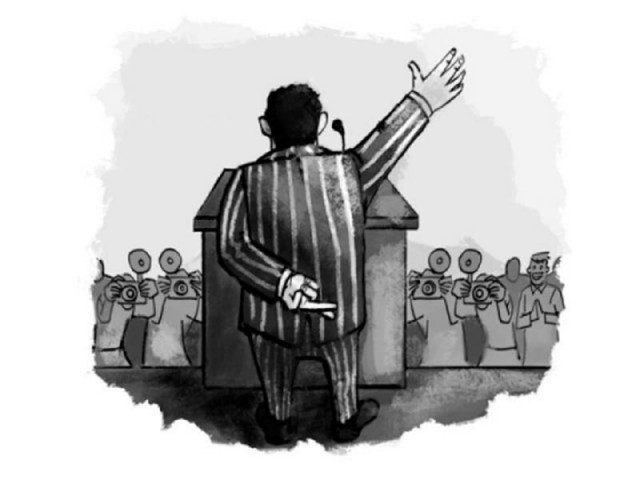Islamabad LG bill: After passing first hurdle, bill now faces parliament
NA standing committee approves draft, opposition parties worried by lack of local input.

Islamabad’s governance might finally be in the hands of Islamabadis, rather than bureaucrats.
On Wednesday, the National Assembly Standing Committee on Interior and Narcotics unanimously approved the proposed ‘Islamabad Capital Territory Local Government Bill, 2013’.
For the first time, the federal capital will have its own metropolitan corporation headed by an elected mayor. The city council will comprise of members directly elected from union councils and wards. Interior Minister Chaudhry Nisar Ali Khan signed the drafted bill, prepared after consultation with the Islamabad Capital Territory Administration and other stakeholders.

The draft ICT Local Government Bill 2013 and some additional recommendations from the NA panel members will likely to be presented before parliament next week.
In July 2013, the Supreme Court had directed the government that “elections have to be held both in rural and urban areas and there should not be any distinction between both the areas for holding elections”.
If passed, the bill — a copy of which available with The Express Tribune — would cover all areas falling within ICT.
What’s inside
The draft continues to read that the scheme of local government for ICT includes a metropolitan corporation and union councils. A union council shall consist of a directly-elected chairman, vice chairman, and six general members, and reserved seats for two women, one peasant or worker, one youth and one non-Muslim, it added.
The entire union council shall be the constituency for the elected and reserved posts, while the metropolitan corporation shall consist of chairmen of all union councils and include the indirectly elected members including women, workers, technocrats, youth and non-Muslims.
The mayor and deputy mayor shall be elected as joint candidates by chairmen of all union councils and members on the general as well as on reserved seats, it further read. After passage of this bill, the government will specify local areas within ICT as union councils and for the metropolitan corporation.
Under the new laws, the government may divide a local government into two or more local governments or alter the limits of a local government.
With the repeal of Capital Development Authority Ordinance Section 15-8, the municipal functions shall be divided between the union councils and the metropolitan corporation. The functions of both are subject to the provisions of the CDA Ordinance and ICT Zoning Regulations.
The local government will be able to collect direct taxes to run expenditures. MNA Syed Asif Hasnain of Muttahida Qaumi Movement suggested that the mayor must be empowered to levy taxes, fee, rate, toll, charge or surcharge specified in the fourth schedule. “Islamabad must have a model have model system.”
The proposed bill, which was approved without lengthy debate, further reads that the requirements for candidates include 25 years of age, Pakistani citizenship and enrollment on electoral rolls in the specific union council. The term of the local government shall be five years from the date of its first meeting and the mayor may be removed from office by a two-thirds majority of the members, it added.
Overlaps
The development, planning and overall maintenance of the master plan within the specified area of ICT will continue to rest with the CDA, and thus the overall master plan as well. On this point, experts feared the CDA and the metropolitan corporation may clash over some key administrative matters under the existing law and provisions of new law.
Former CDA chairman Kamran Lashari, termed the latest development “a call of the day”, but noted that some issues could easily be politicised. “Political repercussion after the election of a mayor could very well happen,” he told The Express Tribune.
Oversight
The government shall appoint a local government commission conduct inspections, inquiries, audit, resolve disputes with governments, enquire into matters referred, submit annual report on performance, and take cognisance of violation of laws. A retired civil servant or senior citizen of integrity will be chairman of this commission for five years. Two members from the general public will be nominated by the leader of the house and leader of the opposition in the National Assembly. The government will also nominate two technocrats and two representatives, each nominated by chief commissioner Islamabad and the CDA chairman. The city council will also appoint inspectors who will be able to impose fines through ticketing to ensure good governance.
The auditor general of Pakistan will conduct audits of the city council’s accounts and final reports will be submitted to parliament, Interior Ministry Additional Secretary Imtiaz Tajwar informed the committee. “Islamabad enjoys special status — this is why its local government system would be a model for others cities,” he observed.
Good or bad?
Zafarullah Khan, a leading campaigner for a local government system in Islamabad termed the approval ‘a positive step’. At the same time, he pointed out that lawmakers who represent Islamabad in parliament were not invited by the committee.
PPP Senator Saeeda Iqbal said her party will oppose the bill until their recommendations are included. She said the draft of the bill has been taken from the Punjab local government bill, which is not acceptable to them. “I will take this issue up with colleagues in the Senate when it is tabled there,” she added.
Senator Osman Saifullah Khan, who also represents Islamabad, said they will review this bill when it is referred to the Senate committee. He expressed his concerns as many Islamabad representatives were not consulted in legislation on the Islamabad-Rawalpindi metro bus project either. “It’s unfair — their input must be taken on all issues related to the capital.”
Published in The Express Tribune, October 16th, 2014.



















COMMENTS
Comments are moderated and generally will be posted if they are on-topic and not abusive.
For more information, please see our Comments FAQ